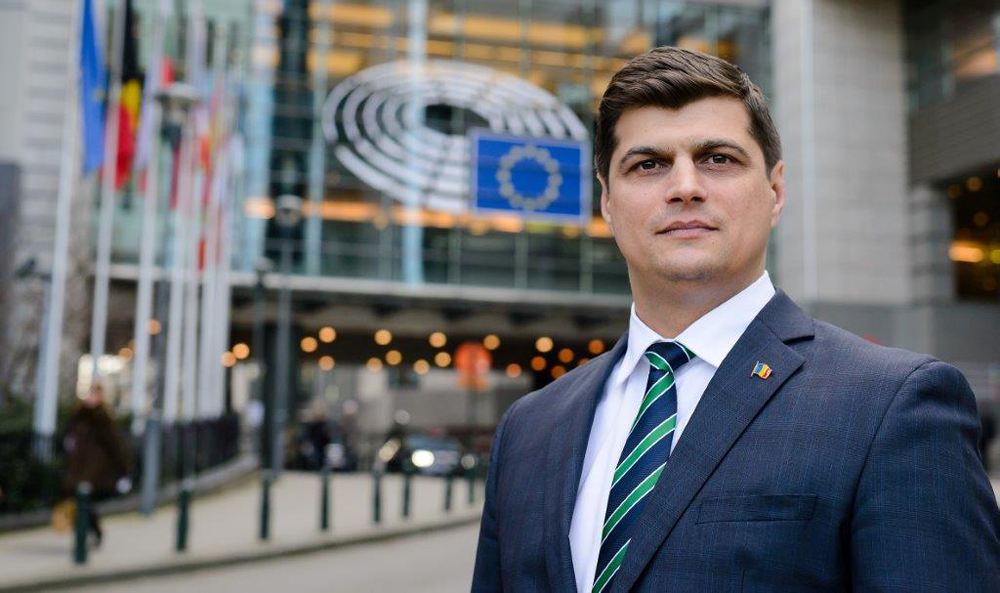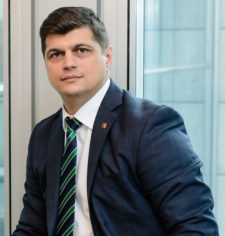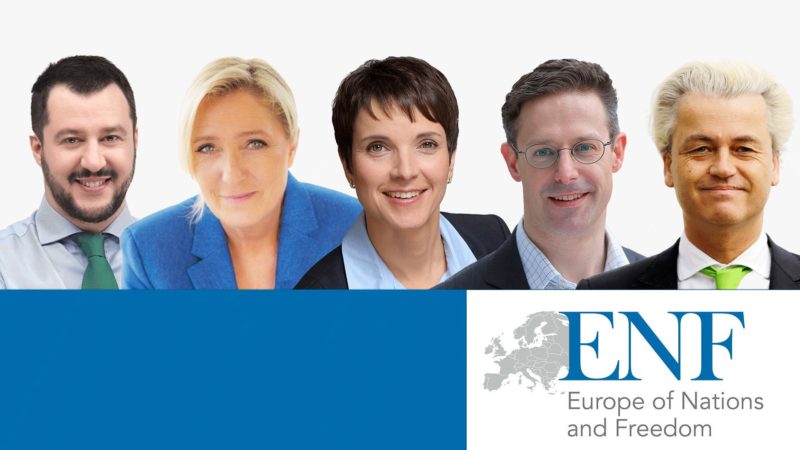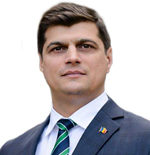 MEP Laurențiu Rebega, Romania, is the vice-president of Europe of Nations and Freedom Group (ENF) in the European Parliament.
MEP Laurențiu Rebega, Romania, is the vice-president of Europe of Nations and Freedom Group (ENF) in the European Parliament.
Why I am running for European Parliament presidency
Romanian MEP Laurentiu Rebega wants to become president of the European Parliament. He will face huge resistance by the European mainstream parties. Here are his own words about the situation.
Published: January 16, 2017, 12:28 pm
Today’s Europe is facing uncommon challenges. There are risks, there are threats and there are opportunities. Such turmoil has always existed, but the instability of our world seems to grow gradually, from year to year and the citizens feel that we are in a crisis to which we do not see an end.
In the last decade and more recently, the European Union has experienced and is still facing a number of complicated economic, social or political crises. The European institutions have not come up with sustainable solutions for these crises, but offered mostly palliative ones.
The decisions of the European Parliament are far from the understanding of the majority of citizens. The bureaucracy of the European Parliament acts as a leveller without taking into account the particular contexts of the communities. The decision-making mechanisms of the European Parliament are burdensome, rigid and, thus, decisions are difficult to rectify.
The Europe of Nations and Freedom Group (ENF) entrusted me to be its candidate for the presidency of the European Parliament. For me it was a difficult decision. I am a young politician, I am at my first term as a MEP, and I come from a country where I do not have a strong political party to support my actions. However, after 10 years of EU membership, Romania is still one of the poorest countries in Europe, and people in my country are more and more euroskeptical.
I took this decision because I am concerned about the increasing distance between the European institutions and the interests of our citizens. As I said, it was not an easy decision, but I received the support of all my colleagues from the ENF Group.
I believe that a better Europe could only be built with stronger nations! Cooperating nations, not dominated nations!
What is important is to avoid mistakes and blunders from the past. The parliament has to be a barometer of the real state of our citizens. When I say barometer, I refer to the fact that we need to understand the European realities from a qualitative point of view with a clear vision towards the future and not from a quantitative perspective only, which might be biased. The quantitative analysis before Brexit is an example in this regard.
It is true that the president of the EU does not have a large area of attributions, but he/ she can maintain a certain equilibrium between the several opinions existing at the European Parliament. Small political groups are usually disadvantaged in comparison to the bigger ones. The domination of two big groups is not beneficial to this institution, and this situation is not very democratic. Therefore, I believe that at the Conference of Presidents, the future president of the European Parliament has to act in a very balanced way and connect the debates taking place in this House to the realities lived by our citizens.
I think also that the EP has to be more active in firmly opposing the Commission’s slippages.
As for the general situation of Europe, I think the reaction to UK referendum is symptomatic: the Brexit vote happened, but the European leaders seem to be paralyzed, confused and not even a move toward a reform of the Union was put into discussion. My role as a candidate for EP presidency is to open a real dialogue about this endless crisis and to look for the way to solve them! For instance, one way to build a new Europe is a close cooperation of patriotic movements all across EU. On this matter, I salute the meeting between National Front, FPO, Lega Nord, PVV and AfD in Koblenz, Germany, on 21 of January, in an historical event where I am invited to participate too. I think this is the way to build the new force of nations in Europe, because only together the believers in sovereignty will be able to vanquish those who want to destroy our identities and values!
All rights reserved. You have permission to quote freely from the articles provided that the source (www.freewestmedia.com) is given. Photos may not be used without our consent.
Consider donating to support our work
Help us to produce more articles like this. FreeWestMedia is depending on donations from our readers to keep going. With your help, we expose the mainstream fake news agenda.
Keep your language polite. Readers from many different countries visit and contribute to Free West Media and we must therefore obey the rules in, for example, Germany. Illegal content will be deleted.
If you have been approved to post comments without preview from FWM, you are responsible for violations of any law. This means that FWM may be forced to cooperate with authorities in a possible crime investigation.
If your comments are subject to preview by FWM, please be patient. We continually review comments but depending on the time of day it can take up to several hours before your comment is reviewed.
We reserve the right to delete comments that are offensive, contain slander or foul language, or are irrelevant to the discussion.

NOAA Predicts Zero Sunspots for Almost the Whole 2030s
CLIMATEThe United States' government scientific organization, the National Oceanic and Atmospheric Administration (NOAA), predicts zero sunspots from 2031 to 2040. This is an extreme situation that has not occurred in as long as humanity has been counting sunspots, and it leads us into uncharted territory in terms of our solar system. However, this prediction aligns with the warnings of the world-renowned solar researcher Valentina Zharkova for many years, who indicated in 2019 various signs of this catastrophic phenomenon, including the extreme hailstorms we have seen in Europe and the world this summer. The forecast and various observations this year give cause for very significant concern. In this unique analysis, Free West Media explains why.

European Nationalist Parties Forge Cooperation Ahead of EU Elections
EUROPEAN ELECTIONSOn Saturday, August 26, representatives of six European nationalist parties gathered in Budapest. The meeting was initiated by the Hungarian party Mi Hazánk and took place in the national parliament. Representatives of the parties signed a joint declaration that not only reaffirms the parties' friendship but also their unity on a range of complex political issues. A surprisingly clear and radical manifesto was established. The hope is that this cooperation will lead to success in the EU elections and eventually result in the formation of a group in the European Parliament. For Swedish nationalism, this meeting marks a success as Sweden, for the first time, has a party represented in a leading nationalist cooperation in Europe. Free West Media was present at this historic event.

Turkey Believes Sweden Hasn’t Done Enough
Sweden will have to wait a bit longer for NATO membership, according to Turkey's Justice Minister Jilmaz Tunc. First, Sweden must extradite the "terrorists" Turkey wants and stop the desecration of the Quran.

Swedish Weapon Takes Down Russia’s Best Attack Helicopter
The Russian attack helicopter Ka-52 is considered one of the world's best and has struck fear in Ukraine, where it has hunted down tanks and other armored vehicles, often beyond the range of many light anti-aircraft systems. However, it has met its match in the Swedish air defense missile system RBS 70, which has quickly led to significant losses for the Russian helicopter forces.

Strong Confidence in German AfD
Alternative for Germany (AfD) held a party conference on July 29-30 to select candidates for the upcoming EU election next year. EU Parliament member Maximilian Krah, belonging to the party's more radical, ethnonationalist faction, was appointed as the top candidate. The party's two spokespersons delivered powerful speeches criticizing the EU's failed migration policy and trade sanctions that isolate Europe and Germany from the rest of the world. They argued that it's time for the EU to return a significant portion of its power to national parliaments. However, they have dropped the demand for Germany to exit the EU.

The Establishment Wants to Ban Germany’s Second Largest Party – for the Sake of Democracy
The rising popularity of AfD has raised strong concerns within the establishment. Despite lies and demonization in the media and isolation from the overall political establishment, the party continues to grow. Certain representatives of the party are accused of becoming increasingly "extreme," and in an unusual move, the influential weekly newspaper Der Spiegel demanded that AfD be "banned."

Dutch FvD break through the media blockade
What is happening in the Netherlands? It is often difficult to follow events in other countries, especially when distorted by system media. We give Forum for Democracy (FvD) the opportunity to speak out on the political situation in the Netherlands and the staunch resistance they face in trying to save the country.

The Ursula von der Leyen Affair
After a criminal complaint in Belgium against the President of the European Commission, the so-called SMS-case, now takes a new turn. The judge responsible for the investigation will likely gain access to the secret messages exchanged between Ursula von der Leyen and Albert Bourla, CEO of Pfizer, at least if they haven't been deleted.

Publisher of Unique Literature Worldwide Blocked by International Distributor
Arktos has distinguished itself by publishing groundbreaking philosophers and social critics. Now, the publisher's international distributor has abruptly terminated the cooperation, and more than 400 already printed titles cannot reach their audience. There is strong evidence that the distributor has been under pressure, something that has also happened in Sweden. We have spoken with Arktos founder Daniel Friberg about the ongoing struggle for freedom of speech in a shrinking cultural corridor.

Care prompts bishops to criticize transgender ideology
The Catholic bishops of the Scandinavian countries presented an open five-page letter criticizing transgender ideology on March 21, just before Easter. The document primarily expresses care and advice and was read aloud in Catholic churches in Sweden, Norway, Finland, Denmark, and Iceland. Cardinal Anders Arborelius, Bishop of Stockholm, is one of the signatories of the document.








